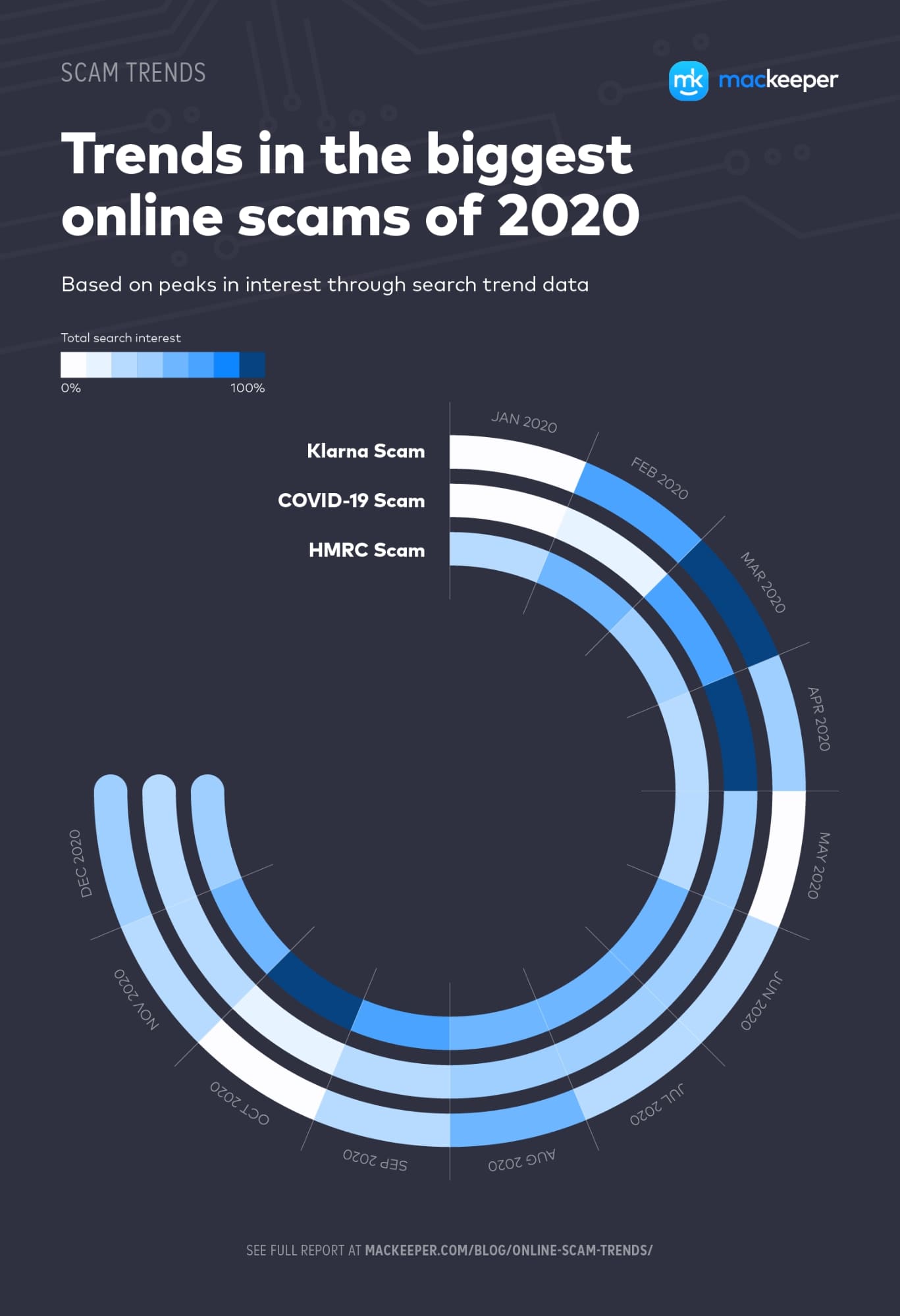In this article you will find the following:
The scam success timeline
See which scams peaked and when with our cybercrime timeline.

Lottery scams peaked in the early 2000s
An email arrives telling you you’ve won the lottery — exciting, right? Not if when you click on the link to receive your winnings, you actually lose money instead.
The lottery scam was at its most potent in 2004, although it peaked again four years later and has never really gone away completely.
It’s most popular in Nigeria, although people are also reporting it heavily in South Africa and in the UK.
Scams around winning money are always popular. After all, the idea of winning that much is just too big a temptation for some people to ignore. The thought of ‘What if it’s real?’ will always entice people into clicking.
Our top tip: Always check the sender’s name before you open an email. If it’s spelled wrong or includes any unusual characters, we’re sad to say you’re not going to be a millionaire.
2006 was a big year for dodgy dating
You receive an email from a beautiful lady, looking for a man just like you to spend the rest of her life with. All she needs is for you to reply with a picture of yourself, your sort code and your account number. Why? Because she can’t afford the plane tickets to get away from her abusive father without your help.
There are multiple variations of this dating scam, but all of them involve you becoming poorer and still not married to exotic beauty, sadly. They were at their most successful during the January of 2006, but have been a scamming mainstay ever since. Just like with money, romance is something people don’t want to say no to, making it an easy way to trick people out of their information.
Our top tip: Any email asking you for your sort code and the account number is likely to be a scam. Even your bank won’t ask you for those details, so a potential love interest definitely shouldn’t.
PPI scams came out of nowhere
PPI (Payment Protection Insurance) wasn’t something anyone was talking about, until all of a sudden, in September 2009, it was everywhere. Not only were legitimate businesses trying to help you claim it back, but a lot of fake ones were too. Emails telling you they could claim PPI back for you rocketed, with many of them asking for the same old information — sort code and account number.
The problem with these emails was their believability. It made sense for them to need your bank details, or else how could they send you the money you were owed?
They caught a lot of people out, especially as a deadline was set for people to get this money back.
Our top tip: The PPI deadline passed in 2019, so if you get an email about it now it’s definitely a fake. Also, no legitimate business would ever ask you for your bank details like this.
The threat of a hitman hit heights in 2007
This one might seem a little out of leftfield, but in July 2007 searches boomed for an email from a hitman. The hitman, according to his story, had been contacted by someone you thought of as a friend and paid a hefty sum to kill you. The only way for you to stop your death was by — yes, you guessed it — paying him more.
The email came with a scary note suggesting that you were being watched, and if you contacted the police you’d be killed straight away.
The scam worked out of fear. While the email didn’t give any of your details away, it made it extremely clear, and its tone was so urgent that many people felt it had to be true.
The threat even went out to your extended family, scaring people into paying the supposed killer off.
Antivirus software has improved significantly since then, so we don’t see much of the hitman anymore. Maybe he decided to try a more reputable line of work.
Our top tip: While these emails might sound scary, if you look at them closely you’ll realize they actually know nothing at all. There’s also a very good chance a real hitman wouldn’t contact you from an email address like deathdealership98(at)hotmail.com.

Covid scams play on people’s deepest fears
A scam that we’ve only started to see recently, for obvious reasons, is the Covid-19 trick. This email or text looks like it’s come from a doctor, and tells you you’ve been selected for a vaccination. Such is people’s desperation to get back to a normal life, the links are clicked and information is given away.
These are phishing emails, so while they won’t take your money, they will mine your devices for personal data which could be used to access your bank account later.
It’s a cruel scam because of how eager people are to believe it.
Our top tip: The Covid vaccines are being given out in order, so don’t expect to be contacted if your group isn’t being included yet. When it does come, it will ask you to call your local health service and book an appointment. It won’t make you click on a link.
HMRC scams result in breaches for Brits
In the UK, HMRC (Her Majesty’s Revenue and Customs) scams can be in the form of an email, phone call, or text message, where they tell you that you’re due a tax refund or that there's a lawsuit pending against you. They continuously circulate around but they are all fake. The huge increase in these means that a scam technique most commonly used in Britain actually made its way into the most prolific scams worldwide of 2020.
Methodology:
The Mackeeper team has analyzed worldwide search volume data of the most prolific 25 scams from 2004-2020 to see which was the most searched for, and ultimately which scam presented the biggest risk during which period. Using this data, we’ve been able to plot a timeline of which types of cybercrime were at their peak and presented the biggest risk to consumers and businesses. Additionally, we looked at the most searched for scams of 2020, which revealed COVID-19, HMRC and Klarna (Buy Now, Pay Later) scams were the most prevalent, and also showing a spike in scams by certain countries.








